Current Lab Members
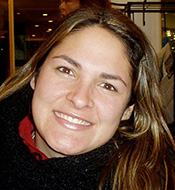 Dr. Juliana Rangel
Dr. Juliana Rangel
Associate Professor of Apiculture
Department of Entomology
Texas A&M University
412 Minnie Belle Heep, 2475 TAMU
College Station, TX 77843-2475
Tel. 979.845.1074; Fax 979.845.6305
E-mail: jrangel@tamu.edu
Website: http://honeybee.tamu.edu
Facebook: https://www.facebook.com/TAMUhoneybeelab
http://entomology.tamu.edu/people/rangel-juliana/

I help manage the molecular side of the Honey Bee Lab and provide input and help on research projects, grants, and as needed.
Innovative Pedagogy Award: 2019
College of Agriculture and Life Science Deans Outstanding Achievement Award for Service: 2020
Caleb Rodriguez
Undergraduate Student
E-mail: crodriguez2@tamu.edu
I am currently doing undergraduate studies at Texas A&M to major in Entomology. My primary interest lies in eusocial insects, and I am currently pursuing research into the defensive behaviors and capabilities of Africanized and non-Africanized honey bees against ant species commonly found in apiaries. Red imported fire ants (Solenopsis invicta) and Crazy ants (Nylanderia sp.) are of particular interest to me given the success of their invasive spread into North America.
Alexandria Nault
Undergraduate student
E-mail:alexandria_n@tamu.edu
Comparing the results of different methods for measuring varroa mite infestation.
Taylor Reams, M.S.
Graduate Student
E-mail: tdreams@tamu.edu
My research focuses on the parasitic mite of the honey bee, known as Varroa destructor. The Varroa mite has 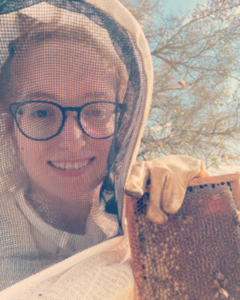 spread almost worldwide and is the leading reported cause of hive loss. The research for my dissertation aims to understand this mite better. This includes studying the genetics, chemical ecology, and behavior of the Varroa mite. Understanding this pest species will help the development of future control methods.
spread almost worldwide and is the leading reported cause of hive loss. The research for my dissertation aims to understand this mite better. This includes studying the genetics, chemical ecology, and behavior of the Varroa mite. Understanding this pest species will help the development of future control methods.
Beekeeping has been in my family for four generations, starting with my great-grandfather. My interest in honey bee research and beekeeper outreach comes from my family’s connection to this field.
Myra Dickey
Graduate Student
E-mail: mdickey2@tamu.edu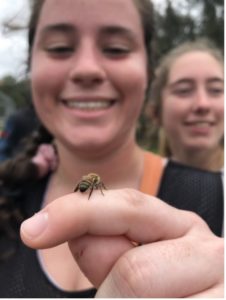
I am interested in characterizing a wild population of honey bees located in south Texas on the Welder Wildlife Refuge. This
population has been extensively mapped over the past twenty years documenting their heritage and gut pathogen levels. I am currently looking the wild population viral titers and will compare them to a nearby managed apiary.
Jordan Twombly Ellis
Graduate Student
E-mail: jt574@tamu.edu
My current research focuses on a novel self-removal behavior in young honey bees. I aim to determine whether this behavior is an altruistic social immune response or a form of extremely accelerated age polytheism. Ultimately, I will mathematically model this behavior and its effects on long-term colony survival.
1) Ford Foundation 2021, Honorable Mention: Predoctoral Fellowship 2) National Science Foundation 2021, Honorable Mention: Graduate Research Fellowship 3) Entomological Society of America Southwestern Branch Meeting 2021 3rd Place: PhD Presentation Award 4) Entomological Society of America 2020 2nd Place: Graduate Student Pollinator Talk 5) Texas A&M University Entomology Department 2020 Honorable Mention: Entomology Graduate Student Forum
Past Lab Members
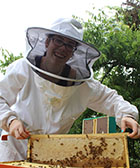 Elizabeth (Liz) Walsh – Graduated Fall 2019
Elizabeth (Liz) Walsh – Graduated Fall 2019
Elizabeth Walsh (Liz) and is from rural Wisconsin. Her undergraduate career was at Ripon College where she majored in biology and English, with a minor in secondary education. Liz has been a beekeeper since she was a young high school student, when she started her own beekeeping operation, Queen B Honey. Liz’s dissertation research primarily focused on in-hive pesticides, such as active ingredients in miticides, and how they impact queen health, physiology, and behavior. Liz is currently a postdoctoral researcher at Agriculture and Agri-Food Canada, where she is working with Dr. Steve Pernal on diagnosing honey bee stressors.
Adrian Fisher – Graduated 2017.
Adrian now is a Postdoctoral Research Associate at Arizona State University.
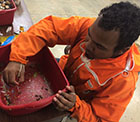 My name is Adrian Fisher II, I did my undergraduate work at Cal Poly Pomona in zoology where I had the opportunity to participate in studies comparing pollination services provided by honey bees and native bee species. The current focus of my research is on the effects of in-hive pesticides on drone fertility, threats to colony health have been among the most pressing issues in honey bee research and insight into potential contributing factors allows us to fit more pieces to the puzzle.
My name is Adrian Fisher II, I did my undergraduate work at Cal Poly Pomona in zoology where I had the opportunity to participate in studies comparing pollination services provided by honey bees and native bee species. The current focus of my research is on the effects of in-hive pesticides on drone fertility, threats to colony health have been among the most pressing issues in honey bee research and insight into potential contributing factors allows us to fit more pieces to the puzzle.
Dr. Alejandra Gonzalez

Postdoctoral Research Associate and Molecular Laboratory Manager
Lauren Ward
 Rangel Lab Apiary Manager, Instructor for Honey Bee Biology Online
Rangel Lab Apiary Manager, Instructor for Honey Bee Biology Online
I am a Texas A&M University graduate with a Master’s of Science in Entomology. My education was in Animal Science and Entomology, with entomological emphasis on systematics and biological control. Toward the end of my college career I discovered an interest in honey bees. Apiculture has finally combined my love of insects with livestock husbandry. My role in the Honey Bee Lab includes the day-to-day management of our apiary and serving as an instructor for the Honey Bee Biology course, Entomology 320. I also conduct research and assist with projects at the apiary. I love learning about honey bees and enjoy teaching others about these fascinating insects.
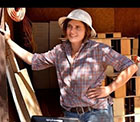 Megan Mahoney
Megan Mahoney
Former Team Leader
Texas A&M University Tech Transfer Team
m-mahoney@tamu.edu
Ms. Ashley Jones
Dr. Pierre Lau
plau0168@gmail.com
Twitter: @MississippBees
I am broadly interested in pollinator foraging biology, nutritional ecology, and the interactions between nutrition and the stressors bees are exposed to.
bees are exposed to.
USDA Predoctoral Fellowship, Texas A&M Association of Former Students Distinguished Graduate Student Award, North American Pollinator Protection Campaign research grant, Eastern Apicultural Society Research Grant, Foundation for the Preservation of Honey Bees Graduate Student Research Scholarship.
Alexandria (Alex) Payne
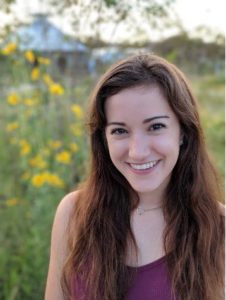 Graduate Student
Graduate Student
E-mail: alexnpayne@gmail.com
Alex obtained her bachelor’s degree from Texas A&M University where she double majored in Bioenvironmental Sciences and Wildlife and Fisheries Sciences with a Wildlife Ecology and Conservation concentration. Her dissertation research has focused on the disease ecology of honey bees and how factors such as in-hive pests and nutrition impact host-pathogen interactions and honey bee health.
NSF Graduate Research Fellow; Texas A&M Doctoral Diversity Fellow; College of Agriculture and Life Sciences Merit Fellowship; Texas A&M Vice Chancellor’s Award in Excellence for Graduate Student Research; Montgomery Award- Texas A&M Graduate Student Service and Leadership Award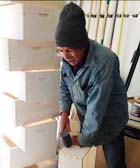
Mr. E.T. Ash
Beekeeping Consultant and Mentor
gene_ash@earthlink.net
Dan Aurell
Texas A&M University’s Tech Transfer Team Leader
Bee Informed Partnership
https://beeinformed.org/about/tech-transfer-teams/
My first real introduction to beekeeping was learning on the job on a bee farm in the Annapolis Valley in Nova Scotia, Canada; I’ve been hooked ever since. I have also had the chance to work a season for a large beekeeping operation in New Zealand, where one of the neat things we did was to ship package bees back to Canada. My work experience is mostly in production agriculture, and I have a B.S. in Biology from Acadia University. I grew up in Sweden and Atlantic Canada.
Since arriving in Texas it has been so interesting to meet commercial beekeepers that operate out of the state. It is such a treat to work in step with the seasons and in the middle of a dynamic environment. I am excited to be in a role where I can help bee farmers to respond in time to the challenges that come out of this changing environment.